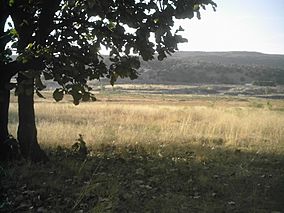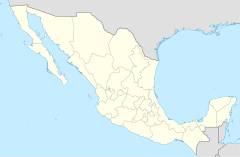La Primavera Biosphere Reserve facts for kids
Quick facts for kids La Primavera Biosphere Reserve |
|
|---|---|
| La Primavera Flora and Fauna Protection Area | |
|
IUCN Category VI (Managed Resource Protected Area)
|
|
 |
|
| Location | Jalisco, Mexico |
| Nearest city | Guadalajara |
| Area | 30,500 ha (118 sq mi) |
| Designation | biosphere reserve and flora and fauna protection area |
| Designated | 2000 (flora and fauna protection area) 2006 (biosphere reserve) |
| Administrator | National Commission of Natural Protected Areas |
The La Primavera Biosphere Reserve is a special natural area in western Mexico. It is also known as the La Primavera Flora and Fauna Protection Area. This important reserve is found in the state of Jalisco. It is located right next to the big city of Guadalajara.
Contents
Exploring La Primavera's Geography
La Primavera covers a large area of 305 square kilometers. The land here is quite rugged, meaning it has many hills and valleys. Its elevation ranges from 1400 to 2200 meters high.
Volcanic Landscape and Water Sources
The reserve includes the Sierra la Primavera. This is an inactive volcanic area. The mountains here were formed by a series of eruptions. These eruptions happened between 120,000 and 20,000 years ago.
There are many natural springs and 20 streams that flow all year round. Some of these streams flow north or east into the Río Grande de Santiago. Other streams flow west and form the beginning of the Ameca River.
Climate of the Reserve
The climate in La Primavera is tropical, warm, and a bit humid. The average temperature throughout the year is about 21 degrees Celsius. The reserve gets about 980 millimeters of rain each year.
Plants and Animals of La Primavera
The main type of natural plant life here is the pine–oak forest. This means you'll find many pine and oak trees.
Amazing Plant Life
More than 772 different kinds of plants have been found in the reserve. This includes 80% of all the orchid species found in Jalisco.
In the western part of the reserve, stream valleys are home to patches of cloud forest. These forests are very special. They are often covered in mist or clouds.
Some common trees in these cloud forests include Clethra rosei, Ficus insipida, and Ilex dugesii. You can also find Morella cerifera, Persea hintonii, and Prunus serotina (a type of cherry). Other trees are Quercus magnoliifolia, Quercus confertifolia (a type of oak), and Salix taxifolia (a type of willow).
A new type of poplar tree, called Populus primaveralepensis, was recently discovered here. It grows only in these stream valleys.
Diverse Bird Species
The reserve is home to 205 different kinds of birds. These include birds that live there all year and those that migrate.
Some native birds you might see are the lesser roadrunner and the colorful berylline hummingbird. You might also spot the russet-crowned motmot and the black-throated magpie-jay.
Other interesting birds include the spotted wren, the brown-backed solitaire, and the blue mockingbird. Look out for the collared towhee, the blue bunting, and the black-vented oriole. The rusty-crowned ground sparrow also lives here.
Mammals, Reptiles, and Amphibians
La Primavera is also home to 73 different kinds of native mammals. These include various animals like deer, rabbits, and many smaller creatures.
In addition, 49 species of reptiles and amphibians live in the reserve. This means you can find many types of snakes, lizards, frogs, and salamanders here.
Protecting La Primavera's Nature
La Primavera was first made a forest protection area and wildlife refuge in 1980. This was done by a special order from the president.
Official Designations
In 2000, the Mexican government officially made it a flora and fauna protection area. This helps protect its plants and animals.
Then, in 2006, UNESCO named it a biosphere reserve. This is a global recognition for places that protect nature while also allowing people to live and work sustainably.
Recreation and Benefits for People
Guadalajara is Mexico's third-largest city. It has grown right up to the edge of the reserve. La Primavera is a favorite place for people from the city to visit and enjoy nature.
The reserve has 12 trails for hiking and exploring. There are also 8 educational camps. About 1560 hectares of the reserve are set aside for public use and fun activities.
The forests in the reserve do many good things for the city of Guadalajara. They help keep the climate cooler and improve the air quality. They also soak up carbon dioxide and other air pollution.
These forests also help keep the region's rivers clean. They refill the underground water supplies and reduce the risk of floods in towns downstream.
See also
 In Spanish: Bosque de la Primavera para niños
In Spanish: Bosque de la Primavera para niños
 | James Van Der Zee |
 | Alma Thomas |
 | Ellis Wilson |
 | Margaret Taylor-Burroughs |


